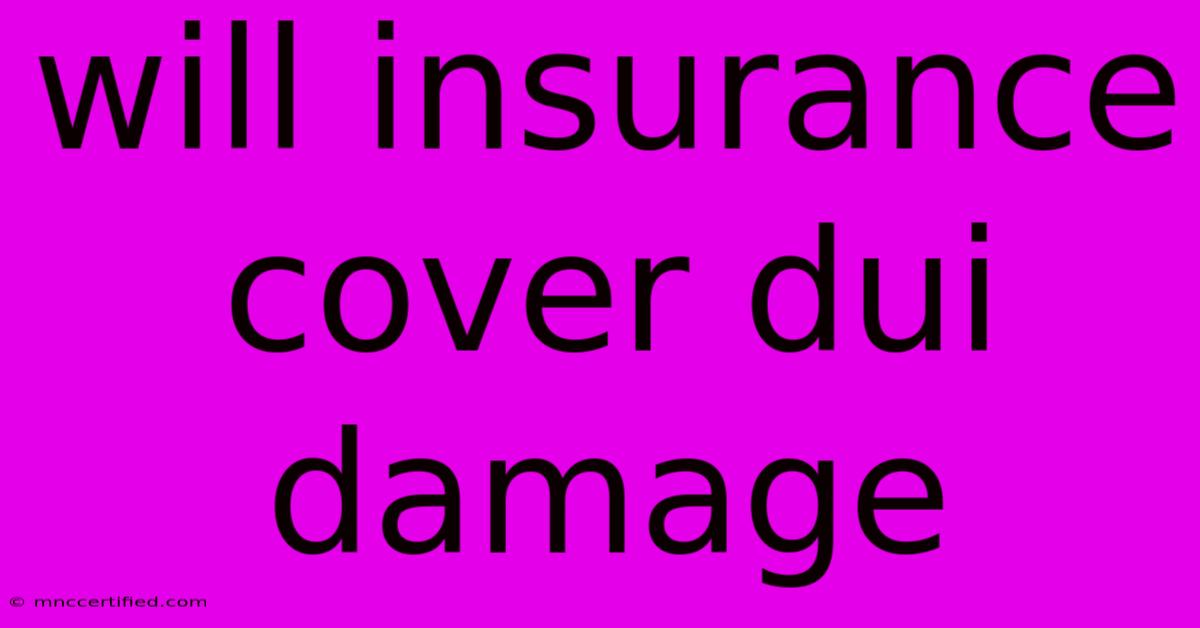Will Insurance Cover Dui Damage

Table of Contents
Will Insurance Cover DUI Damage? A Comprehensive Guide
Driving Under the Influence (DUI) significantly impacts your insurance coverage. While your insurance might cover some damages resulting from a DUI accident, it's not guaranteed. Understanding your policy and the legal ramifications is crucial. This article will clarify the complexities of insurance coverage following a DUI.
Understanding Your Policy: The Fine Print Matters
The specifics of your insurance coverage after a DUI depend heavily on your policy's terms and conditions. Most standard auto insurance policies include liability coverage, which protects you financially if you cause an accident that injures someone else or damages their property. However, DUI significantly affects how your liability coverage applies.
-
Liability Coverage and DUI: While your liability coverage might pay for the other person's damages (medical bills, property repairs), your insurer will likely pursue subrogation to recoup those costs from you. This means they'll try to recover the money they paid out. This is often pursued even if you're found not at fault in the eyes of the law if the accident stemmed from your intoxicated driving.
-
Collision and Comprehensive Coverage: These coverages typically address your own vehicle's damages. However, many insurance companies have exclusions for damages incurred while driving under the influence. Your policy might deny coverage entirely or significantly raise your premiums in the future. Carefully review your policy document for specific clauses related to DUI and alcohol-related accidents.
-
Increased Premiums: A Guaranteed Consequence Even if your insurance pays for some damages, expect a substantial increase in your premiums. Insurance companies view DUIs as high-risk events. The increase can be significant, lasting for several years and potentially making your insurance unaffordable.
Factors Affecting Insurance Coverage After a DUI
Several factors influence whether and how your insurance will cover damages after a DUI:
- Your State's Laws: Each state has its own laws regarding DUI and insurance coverage. Some states might have stricter regulations than others.
- The Severity of the Accident: The extent of the damage to property and injuries sustained directly correlates with the payout and your insurer's actions. More severe accidents may result in complete denial of coverage.
- Your Insurance Company's Policies: Different insurers have varying policies regarding DUI accidents. Some might be more lenient than others, but none will look favorably upon such incidents.
- Your Driving Record: A prior history of accidents or traffic violations, particularly DUIs, will negatively impact your chances of receiving full coverage.
What to Do After a DUI Accident
Following a DUI accident, your immediate priorities should be:
- Ensure everyone's safety: Call emergency services if necessary.
- Cooperate with law enforcement: Do not refuse a breathalyzer or blood test.
- Contact your insurance company: Report the accident as soon as possible, providing all relevant details honestly.
- Seek legal counsel: A lawyer specializing in DUI cases can advise you on your legal rights and insurance options.
Preventing Future DUI Incidents
The best way to avoid the financial and legal consequences of a DUI is to never drive under the influence. Plan ahead, designate a driver, or utilize ride-sharing services. Remember, the cost of a DUI far exceeds the potential savings of driving yourself.
Key Takeaways: Insurance and DUI
- DUI significantly impacts your insurance coverage.
- Your liability coverage may cover others' damages but might not cover your vehicle's.
- Expect substantial premium increases, regardless of coverage provided.
- Your insurance company may deny coverage entirely.
- Consult your policy and seek legal advice.
This information is for general guidance only and should not be considered legal or insurance advice. Always consult with your insurance provider and a legal professional for personalized advice related to your specific situation and location. Driving under the influence is dangerous and illegal; prioritize safe driving practices.

Thank you for visiting our website wich cover about Will Insurance Cover Dui Damage. We hope the information provided has been useful to you. Feel free to contact us if you have any questions or need further assistance. See you next time and dont miss to bookmark.
Featured Posts
-
Clement Laments Rangers Point Loss
Nov 24, 2024
-
Homeowners Insurance Lubbock Tx
Nov 24, 2024
-
Ole Misss Lost Playoff Chances Analysis
Nov 24, 2024
-
Is Veneers Covered By Insurance
Nov 24, 2024
-
1 1 Draw Rangers Vs Dundee United
Nov 24, 2024